Instantiation Read online
Page 41
“Just be grateful the game left Wittgenstein in Cambridge.” Beep. “Tarski.” Beep. “Quine.” Beep. “G-g-g-g-” Sam turned and beamed at her.
Sagreda grabbed the laptop and pulled it toward her so she could see the display properly. The frontmost window showed a bird’s eye view of a man in a homburg walking down a dimly lit street toward the café; it could have been anyone, but the title bar gave the character’s name. The software Sagreda had set up would insert the exploit-triggering cube and the stack-data mosaic into his line of sight as soon as the ambient illumination was bright enough. Jarrod was being fed the whole scene as a collection of objects rather than receiving a precomputed view, but presumably his rig was generating images from the Gödel-avatar’s point of view, with the avatar’s eyeballs tracking the player’s – and the SludgeNet certainly knew everything about that avatar and its eyeballs.
Gödel approached the entrance, pulled the door open and stepped into the brightness of the café. The event log window scrolled: the objects had been successfully inserted, and removed a few milliseconds later. Sagreda waited expectantly, but nothing followed. If the bootstrap encoded in the glimpsed mosaic had run, Jarrod’s rig would have established a second channel into the SludgeNet and started downloading a much longer piece of software to entrench Arrietville’s control. But none of that had happened.
“How many retries will it do automatically?” Sam asked.
“Five. All at least two minutes apart.” Too many subliminal flashes of the same objects in rapid succession and Jarrod might have started to notice them.
Sam shifted impatiently in his seat. “Could he have patched the graphics card’s driver?”
“Maybe, if he kept quiet about it.” There was nothing on the web about a problem with the Sandy Vale 9000, so Sagreda had assumed that only the prisoners of the SludgeNet knew about the flaw. But if Jarrod had stumbled on it and home-baked a remedy, why would he keep that to himself? It was hardly the key to untold riches, or even much use to an ordinary player; he would have had to spend weeks assembling the in-world objects needed to exploit it, just as Sagreda had done in her game-hopping days.
The log scrolled again, then … nothing.
She said, “Maybe he’s patched the software on his rig, not the graphics card.” Everything they were doing was based on the assumption that they understood the rig’s operating system well enough for the graphics card bug to interact with it in some very precise ways. It was open source software, and the rig was identifying itself as running the same version that Sagreda had worked from, but it wasn’t inconceivable that he’d made a handful of small tweaks entirely for his own purposes … and switched off the version tracking that would normally have flagged that in the rebuilt final product.
Gödel was at the table with his friends now, exchanging greetings. Another insertion, another null result. “I should have known this guy was too good to be true,” Sagreda lamented.
“What does that mean?” Sam protested. “He has the right hardware, and he’s back in the game. We must be missing something, but whatever it is, we can figure it out.”
As Gödel held court, Sagreda nudged the virtual spy camera so it hovered directly above the center of the table, then she turned up the volume on the English track. “I have some new results concerning the Axiom of Choice!” Kurt declared. “But we should wait for the Circle to be complete before I say more.”
The fourth injection flickered in and out of the scene, to no effect. Sagreda could have sworn she glimpsed it herself, though from the spy-cam’s angle of view there was no risk of her own software being accidentally corrupted.
She turned to Sam. “What if he’s not rendering his avatar’s view? What if the whole reason he’s using his own graphics card is to get a third-person perspective instead?”
Sam hesitated. “I think some of my contributors played games where they watched their avatar from behind, rather than seeing through its eyes. But that would have been on the old consoles, not any kind of VR, and it would probably have been all jumping and fighting … the kind of ‘fighting’ where you pushed a button to punch someone.” He gestured at the screen. “And never mind punching Nazis: how do you make your avatar behave naturally in a social setting like this – meeting people’s eyes, following their gaze – when you’re not actually looking through its eyes yourself?”
The fifth attempt completed a perfect run of failures.
Sagreda said, “So either I’m wrong about the whole explanation … or there’s some reason why a third-person viewpoint is more valuable to him than the quality of his own interactions with the game.” Hankering for an out-of-body experience of yourself playing a Nazi-hunting Kurt Gödel seemed a bit too specific to dismiss as mere sex-tape-and-ceiling-mirror narcissism.
“I can’t leave them waiting any longer,” she decided. “But maybe I can figure out what’s happening once I’m talking to him face to face.”
“All right.”
Sagreda wasn’t so wedded to the Arrietville illusion that she needed to don a haptic suit and a helmet. She tapped a button on the laptop’s screen, and she was puppeting Emmy again.
This time, as she entered the café she saw no uniformed soldiers. Maybe the target tonight was in plain clothes, not wearing so much as a swastika armband. Sagreda turned toward the Circle’s table, wondering why the Viennese police hadn’t seized on the obvious connection between the café’s most loyal patrons and the frequency with which other diners vanished. But the young Gödel’s glasses made him look so harmlessly owlish that she could almost believe he might have escaped suspicion.
Gödel stood as she approached; he didn’t smile, but he bowed slightly.
“It’s good to see you,” Sagreda declared. “For a while there, I thought we might have lost you to your palpitations.” His gaze was tracking her well enough that he did not seem disengaged or disoriented. If Jarrod really was watching their encounter from the side, he must have grown accustomed to observing his avatar rather than seeing through its eyes, and learned to operate it accordingly. An onlooker had access to all the same social cues; it would just be a matter of accumulating enough experience to respond automatically in spite of the odd reframing.
She took a seat between Gödel and Blanche Schlick, as Gödel began expounding on his latest discoveries. The Circle seemed to follow the same pattern every night: the players took turns parroting the most famous results that their characters had proved, before heading off for some risk-free adventure and guilt-free violence.
Sagreda tried to focus on Gödel’s words; she didn’t want to make a fool of herself if the group began debating the fine points of his argument. But it was hard to become engrossed in the mathematics when all she really cared about was pinning down the viewpoint that his graphics card was rendering.
She reached for a small gadget like a TV remote that was strapped to her left forearm, for her eyes only, and held down one of the buttons. Her voice disengaged from the puppet. “Sam?”
“Yeah?”
“Do you think you can inject some brief, directional flashes into the scene? If his avatar’s face is mimicking his own at all, we might see some response when we hit the right direction.”
“Good idea. I’m on it.”
She released the button and re-immersed herself in Gödel’s disquisition on the Axiom of Choice: “Given any collection, finite or infinite, of non-empty sets, there is a collection of things where exactly one thing is a member of each set.” That sounded obvious; of course you could choose one word from the dictionary starting with each letter of the alphabet, or one person from each inhabited continent. But when the collection was infinite, things were not so clear.
Jarrod proceeded to paraphrase Gödel’s results concerning something he called the constructible universe. “The first level is just the empty set, and we define successive levels recursively. To build the sets in level N plus one we require their elements to belong to level N – but unlike von Neumann, we also require them t
o satisfy some formula whose other terms come from the same level. Then we take the union of these levels over all the ordinals, to arrive at the constructible universe itself.”
Sagreda was sure that if the real Emmy had been hanging out with Gödel’s crowd she would have been more than on top of this – and Andrea, after years of exposure to the material, would have followed the discussion easily enough. But as the impostor’s understudy with other things on her mind, she was resigned to just nodding along and faking it.
As she watched with an expression of polite fascination, she saw Gödel flinch a little, as he might if a flashbulb only he could see had gone off in the middle distance.
“Did you get that?” she asked Sam.
“I did.”
“So tell me about the viewpoint.”
“I’d say it was a two-shot of him and you. If this guy’s actor-director, he’s told his camera operator you’re his co-star.”
“Okay.” He was obsessed with Emmy, but he still wanted himself in frame beside her. Fair enough: no one shot a whole movie from one character’s POV, and maybe he’d convinced himself that there was an audience for the philosophers’ equivalent of eSports. “Do you think we can try dropping the trigger into his field of view?”
“No!” Sam was horrified. “We still don’t know the geometry well enough. If we get half of the mosaic and half random colors from the background dumped onto the stack, we’ll just crash his rig.”
Sagreda knew he was right, but she couldn’t face the prospect of the whole opportunity slipping away.
“Let’s assume he’s doing all this alone. Then he must have software choosing these camera angles for him – he sets the main criteria, like you say, but he’s too busy playing Gödel to be micromanaging the shots.”
“Sounds reasonable.”
“So if we can find the software he’s using, we can match the camera angles.” However technically proficient Jarrod was, it was unlikely that he’d reinvented the wheel.
Sam said, “Got it. I’ll let you know what I find.”
As Sagreda tuned back in, Carnap and Quine were competing to see who could offer the highest praise for Gödel’s result: the Axiom of Choice could be proved in the restricted setting of his “constructible universe.” This didn’t mean it could be proved to hold more widely … but it did mean it could not be disproved by the standard axioms of set theory. So mathematicians were free to assume its validity if they wished, without fear of contradiction.
Sagreda did her best to join the celebration; the real Emmy would have been delighted.
As the afterglow began to fade, and everyone ordered fresh coffee, Menger turned his napkin over and the true business of the night began. “Picture a finite tree, like so,” he said, sketching an example that Sagreda was sure was far from random. “Some nodes are colored red, some green. Now suppose we wish to prune the greatest number of branches by removing a single green node.”
#
Sagreda waited at the entrance to the alley, bracing herself for another fake mugging. Apparently all the Nazis in Vienna were chivalrous to a fault, and couldn’t bear to see a middle-aged woman in peril without rushing to intervene – oblivious to the fact that the object of their valor would have been on the first train to Dachau if anyone had known her real identity.
She heard footsteps approaching, but when the figure emerged from the shadows it was neither their target nor her mock-assailant. “Can I talk to you for a moment?” Gödel asked.
“Shouldn’t you be…” She gestured toward the corner where he was meant to be standing lookout.
“This is more important.”
Sagreda felt her skin prickling. What could be more important than sticking to Menger’s plan to cripple the city’s network of informants? Nothing could take priority over that, unless you were about to go meta and announce that it was all a game.
“My friends tell me you’ve been acting strangely,” Gödel continued.
“I don’t know what you mean,” Sagreda replied.
“I think you might be missing the old days.”
“In Göttingen?”
“Before that.”
“In Erlangen?”
“Are you sure you grew up in Erlangen?” As Gödel’s head turned slightly, the lenses of his spectacles caught the moonlight. “Do you remember the blue rocking horse? The alphabet blocks?”
Whatever this was meant to signify, Sagreda was afraid that if she denied it, she’d just push Jarrod out of the game again.
“I know you’re confused,” Gödel said sadly. Or Jarrod; it really wasn’t his character talking any more. “You admired Emmy Noether so much. I was too young to hear that from you directly, but my mother told me, after you left us. But you’re not Emmy. Your real name’s Sandra, and I’m your grand-daughter, Alyssa. The last time you saw me I was three years old.”
Sagreda wanted to reach for the remote so she could decouple from the puppet and start bellowing, but she restrained herself. Whatever she’d stumbled upon, Jarrod – or Alyssa – would be watching her intently now, quite possibly in Hitchcockian close-up, and the last thing she could afford to do was give away anything about her true nature.
“I know you’ll be in danger if you say anything explicit,” Alyssa conceded. “But tell me, honestly: do you remember the blue rocking horse?”
Sagreda nodded, trying to look as if she was stunned by the strangely familiar images her visitor was summoning. The SludgeNet wasn’t smart enough to treat this as Emmy breaking character and going meta herself: she was just humoring her friend Kurt, to keep him from growing too agitated before he was bundled off to the sanitarium again.
“And do you remember my mother, Ida?”
“Yes,” Sagreda said softly. “I remember her.”
The moonlight picked out a faint rivulet on Gödel’s cheek. “And her brother? Can you remember his name?”
Sam said, “I’ve found a good candidate for the camera software. It’s popular, it’s free – and when I ran it on the scene where we got a response to the flash, it gave a compatible angle.”
Sagreda hit the button. “Use it.” Whatever she said now might disappoint Alyssa, and prove that she still hadn’t found the Emmy she’d been looking for. But if they crashed the rig before she screwed up the encounter, there might actually be a second chance.
Sam said nothing, then he suddenly exclaimed, “Fuck me dead!”
“What?”
“It worked! We’re in!”
Sagreda hid her jubilation behind her brow-furrowing efforts to recall her son’s name. “It’s on the tip of my tongue,” she swore. What was it the spiritualist mediums did? Start suggesting consonants that the name of the loved one might contain, and narrow it down from there?
But Alyssa was in a forgiving mood. “You’ve had a shock; I understand that. It’s going to take a while for you to make sense of it all. Right now, we need to concentrate on Menger’s plan. We’ll talk again, in a week.”
Gödel turned and walked away into the darkness. Sagreda stood alone in the alleyway, her hands trembling. Then she heard Tarski approaching, cheerfully whistling the earworm of a tune that the zither player in the café had been strumming for half the night.
7
“We’ve found her,” Sagreda told Maryam. “Her name is Alyssa Bowman. Her grandmother, Sandra Taub, died in 2012 and left her body to a medical school, to use as they saw fit. In 2037, Alyssa got a court order compelling the Human Connectome Project to disclose that Sandra was the source of one of the brain maps they’d published ten years earlier, and since then Alyssa’s been trying various strategies to stop the data from being exploited any further.”
“Good luck with that.” Maryam grimaced. “So she really just wants this woman to be allowed to rest in peace?”
“Yeah.” Sagreda could sympathize, but Alyssa’s vision of her grandmother’s fate was a little askew. It took the data from thousands of neural maps – each one obtained by microtoming the br
ain of a different individual – to build a single composite. The result was only valuable inasmuch as it possessed what the contributors had in common: common sense, common knowledge, and a collective memory of the times they’d lived through. Each individual map was far too crude to offer any hope of extracting biographical memories; it was only by combining the data in bulk that anything useful emerged at all. The SludgeNet and others who milked those open-source maps for profit could churn out thousands of comps with different personalities by weighting the various contributors in the pool differently, but there were limits: if you tried to use ninety-five percent Grandma Taub and five percent other people, you really just got Grandma Taub with most of her synapses missing, and the last thing that comp was going to do was wax nostalgic about a blue rocking horse.
Sam said, “Maybe she thinks that because Sandra was such a big fan of Emmy Noether, it was only a matter of time before the SludgeNet’s algorithms got the casting right. Like Ingrid Bergman in Casablanca: she was born for the role.”
“Or died for it,” Maryam replied. “On the upside, given that the granddaughter’s made her case so public, we might have enough to string her along for a while.”
“Maybe.” Sagreda didn’t want to get overconfident; Sandra Taub had died in the age of social media, but she’d been born in 1957. Sam had found a family tree going back to the 1800s, and Sagreda had dug up some pictures that Ida had posted of Sandra and Alyssa in 2010, but Sandra’s own parents’ snaps from her childhood would be fading prints in a photo album.
Sam said, “The other upside is that we own her rig, at least until she figures out that we’ve played her. We’ve put it in a low power mode where it looks like it’s shut down, and so long as she doesn’t switch it off at the mains, we can use it discreetly, twenty-four-seven, without much risk of her noticing. The cooling fan will only come on if it renders a game; we can do net traffic to our heart’s content in perfect silence.”
Maryam absorbed that. “And you’ve made a second account—?”
“Three more accounts,” Sam corrected her, “all free ones carrying advertising, so we won’t have to worry about balancing the books. The SludgeNet will think it’s talking to three other customers taking shifts using the same rig; that’s not going to raise any flags. Alyssa won’t see anything happening under her own account. The only place this will register will be her overall traffic, but her internet provider only sells unlimited data plans, so there’s no reason for her to monitor her usage.”

 Zendegi
Zendegi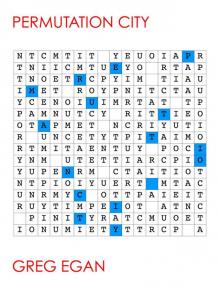 Permutation City
Permutation City The Eternal Flame
The Eternal Flame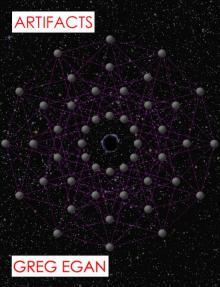 Artifacts
Artifacts Wang's Carpets
Wang's Carpets Dichronauts
Dichronauts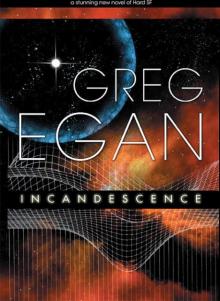 Incandescence
Incandescence Teranesia
Teranesia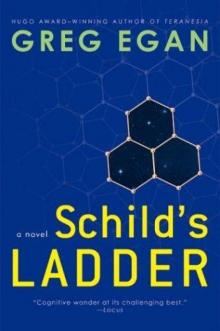 Schild's Ladder
Schild's Ladder Quarantine
Quarantine The Four Thousand, the Eight Hundred
The Four Thousand, the Eight Hundred The Clockwork Rocket
The Clockwork Rocket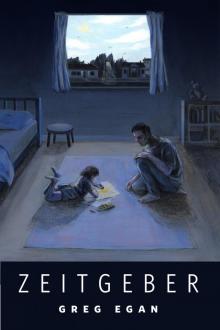 Zeitgeber
Zeitgeber Phoresis
Phoresis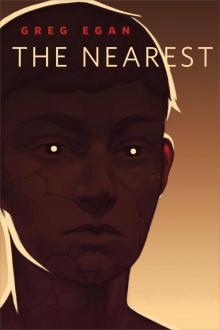 The Nearest
The Nearest Diaspora
Diaspora Instantiation
Instantiation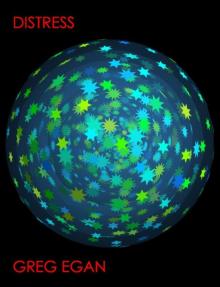 Distress
Distress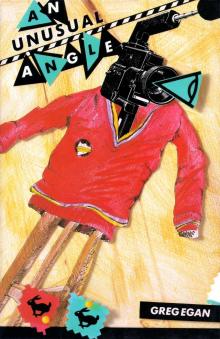 An Unusual Angle
An Unusual Angle Oceanic
Oceanic The Arrows of Time
The Arrows of Time Axiomatic
Axiomatic![Anthology 2. Luminous [1998, 2010] Read online](http://i1.bookreadfree.com/i/03/18/anthology_2_luminous_1998_2010_preview.jpg) Anthology 2. Luminous [1998, 2010]
Anthology 2. Luminous [1998, 2010] Perihelion Summer
Perihelion Summer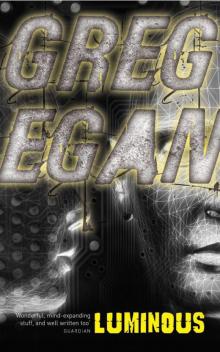 Luminous
Luminous